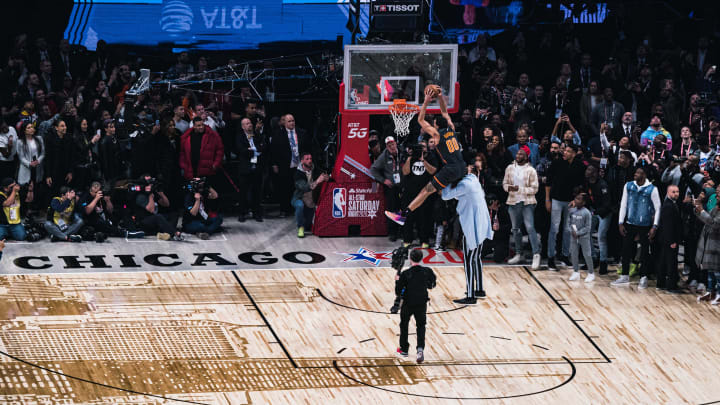The NBA Slam Dunk Contest is Decadent and Depraved

As if the last 44 years of slam dunk contests weren't enough proof, the 2020 NBA Slam Dunk Contest should throw the entire authenticity of the event into question.
Enough fans cried foul when Orlando Magic forward Aaron Gordon was controversially denied the slam dunk crown for the second time in five years, with the title this year going instead to Derrick Jones Jr. of the Miami Heat. Even more questionable are the circumstances surrounding how Jones came away with the title.
According to an ESPN report, the five contest judges had intended for the second tiebreaker round to end in yet another tie. This would have either forced a third tiebreaker round between Jones and Gordon or forced a tie-breaking vote from the judges. But after Gordon's final dunk, where he jumped 7'5" Celtics center Tacko Fall, one judge - possibly Dwyane Wade - didn't follow the script and gave him a nine instead of a ten, thus swinging the victory to Jones.
This implies that not only did the judges of a contest of skill openly collude for the sole purpose of creating drama, but that one judge may have either forgotten their part in the scheme or, as they say in the wrestling dirtsheets, "gone into business for himself". The implications are staggering, and throw into question the connection between the dunk artists' performance and their actual effect on the competition.
Yes, the dunk contest is basically a glorified game of HORSE, but it's a game that the players put a lot of effort and emotion into - especially Gordon, who said after the result that he would likely never enter another one.
Aaron Gordon says he feels like he should have two trophies and likely won’t do the dunk contest again.
— SportsCenter (@SportsCenter) February 16, 2020
(via @Rachel__Nichols) pic.twitter.com/OET4do20dC
Who could blame him? For a contest that players and fans are passionate about, there don't seem to be standards or rules that determine what makes one dunk better, more spectacular, or cleaner than another.
While the three-point shooting contest often plays second-fiddle to the dunk contest on All-Star Weekend, at least we don't have yearly controversies over who wins that competition, mainly because the objective is simple: You either make a three-point shot or you don't. Likewise with the Home Run Derby. Either the ball goes out of the bounds of the field area or it doesn't.
It's a debate similar to that which figure skating fans rehash every time their favorite skater loses a competition to a skater who runs a cleaner but less spectacular routine. Even then, the analogy doesn't quite work, because international figure skating runs on a points system that de-emphasizes the need for human judges.
A points system may, in fact, hurt the dunk contest, restricting players to rehashing the same moves over and over for the sake of higher scores. We would never see players bring out cars, ladders, or other people to dunk over. After all, that wouldn't be in the code, would it?
The best course of action would be for fans to know what exactly the judges of the dunk contest are judging. Artistry? Execution? Airtime? Maybe give a score for multiple different categories. It may have stung fans a little less to know exactly why a judge thought Aaron Gordon's final dunk was worth one point less than Derrick Jones'.